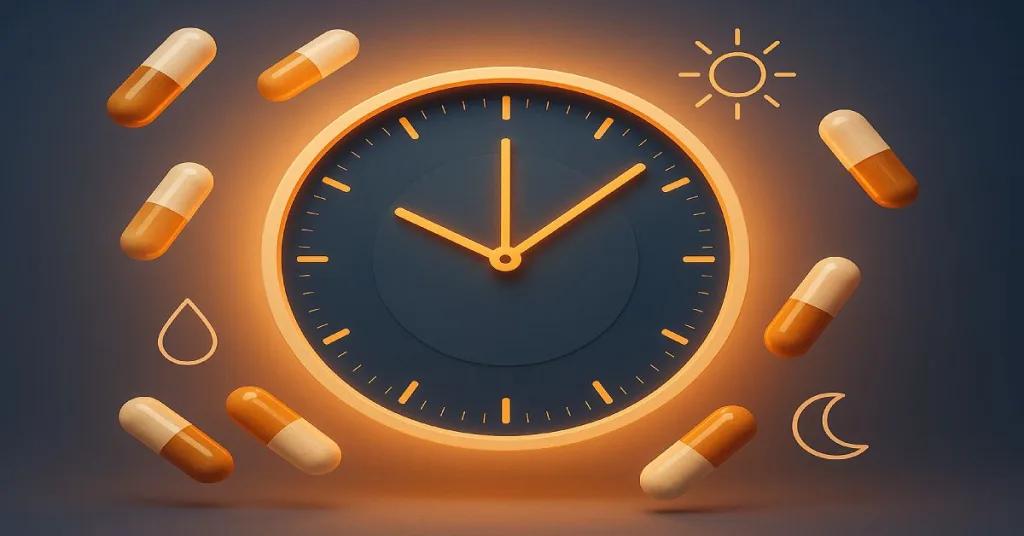Fasting has exploded in popularity. From 16:8 intermittent fasting windows to 48-hour “reset” fasts, millions of people now use fasting as a tool for weight loss, longevity, and mental clarity.
But there’s one question that rarely gets a straight answer:
Should you still take your supplements while fasting — or skip them altogether?
Let’s break down what fasting really does to your body, which supplements actually make sense during it, which ones can do harm, and who should avoid fasting in the first place.
This article may contain affiliate links. If you click through and buy, we may earn a small commission at no extra cost to you.
What Fasting Really Means (and Why It Matters for Supplements)
Fasting simply means not eating for a set period of time — but there’s more than one way to do it.
- Intermittent fasting: Eating within a daily window (e.g., 16 hours fasting, 8 hours eating).
- Alternate-day fasting: Fasting every other day.
- Prolonged fasting: Going 24–72 hours or more without food.
- Water-only fasting: No calories at all — not even from supplements.
When you fast, your insulin levels drop, your liver switches from burning glucose to fat, and your body starts a process called autophagy — cellular cleanup and recycling.
That’s the good news. The flip side? Your digestive system slows down, stomach acid drops, and your ability to absorb certain nutrients changes drastically. That means not every supplement will work the same — or even be safe — while you’re fasting.
Is Fasting Actually Healthy?
The short answer: for most healthy people, yes — in moderation and with proper nutrition.
The long answer: it depends entirely on your health status, what kind of fast you’re doing, and how you resume eating afterward.
Potential Benefits
- Improved insulin sensitivity: Makes it easier to manage blood sugar.
- Reduced inflammation: Many people report lower joint pain and clearer skin.
- Fat loss: The body shifts toward burning stored fat once glycogen is depleted.
- Cellular repair: Autophagy removes damaged proteins and waste.
- Mental clarity: Some people feel sharper when not constantly digesting food.
Potential Risks
- Electrolyte imbalances: Sodium and potassium loss can cause fatigue and heart palpitations.
- Low blood pressure or dizziness: Especially common in people taking medication.
- Muscle loss: Without proper refeeding or protein intake.
- Heart issues: Those with congestive heart failure (CHF) or arrhythmias should use caution.
- Nutrient deficiencies: Long-term fasting can deplete magnesium, zinc, and B-vitamins.
Who should avoid fasting:
Anyone with diabetes, thyroid disease, eating disorders, severe fatigue, or heart conditions — and anyone taking daily medication that requires food (such as Lisinopril or beta-blockers).

Why Fasting Changes How Supplements Work
Your digestive system depends on certain conditions — acid, bile, enzymes — to absorb vitamins and minerals. Fasting reduces those secretions.
For example:
- Fat-soluble vitamins (A, D, E, K) require bile, which is released when fat enters your system. Without food, your body barely produces bile — so these nutrients can’t be absorbed efficiently.
- Iron, zinc, and magnesium can irritate an empty stomach and trigger nausea.
- Fish oil can cause heartburn without food to buffer it.
- Multivitamins often contain a mix of both fat- and water-soluble nutrients, so half of them go to waste if taken while fasting.
So while fasting may cleanse your system, it also makes it less ready to use many supplements.
Supplements You Can Safely Take While Fasting
Here’s what typically plays well with an empty stomach or during fasting windows:
1. Electrolytes (Sodium, Potassium, Magnesium)
These are non-negotiable during longer fasts. As insulin drops, your kidneys excrete sodium and water — leading to dehydration, cramps, or dizziness.
- Use unsweetened electrolyte powders with zero calories and no artificial sweeteners.
- Magnesium glycinate or citrate can be taken during fasting if you tolerate it well.
2. Vitamin B12
Water-soluble and well-tolerated without food.
- Helps energy production and prevents fatigue.
- Particularly useful during long fasts when energy dips.
3. NAC (N-Acetyl Cysteine)
Supports liver detox and antioxidant defense.
- May help protect cells during fasting-induced stress.
- Can be taken on an empty stomach, though some prefer it with a light meal later.
4. L-Carnitine
Helps the body transport fatty acids into cells for energy — a perfect match for fat metabolism during fasting.
- Best for short fasts (like intermittent fasting).
- Avoid during multi-day water fasts unless medically supervised.
5. Herbal Teas and Extracts
Caffeine-free options like ginger or green tea can help control appetite and support digestion.
- Avoid sweetened or “detox” teas with hidden calories or laxatives.
Supplements to Avoid During Fasting
1. Multivitamins
Contain fat-soluble vitamins and minerals that need food for proper absorption.
- Waste of money during fasting hours.
- Some blends cause stomach pain or nausea when taken alone.
2. Fish Oil or Omega-3
Fat-based supplement — will likely make you feel sick without food.
- Save for your first meal after breaking the fast.
3. Fat-Soluble Vitamins (A, D, E, K)
Need dietary fat to be absorbed. Taking them on an empty stomach is ineffective.
4. Zinc, Iron, and Copper
All irritate the stomach without food and can cause nausea or acid reflux.
- Iron can also raise oxidative stress if taken during prolonged fasting.
5. Protein or Amino Powders
Anything with calories, especially protein, breaks your fast — period.
- The same goes for collagen, BCAAs, or “fasting-safe” aminos marketed online.
6. Adaptogens (Ashwagandha, Rhodiola, Ginseng)
While popular for stress balance, adaptogens can spike or drop cortisol unpredictably when combined with fasting’s natural stress response.
When to Take What: Timing Your Supplements Around Fasting
During the Fasting Window
- Stick to: water, black coffee, herbal tea, electrolytes, and maybe NAC or B12.
- Take them mid-fast to avoid early stomach irritation.
During the Eating Window
- Take: your multivitamin, CoQ10, Omega-3, Vitamin D, magnesium, zinc, and any herbal or adaptogenic blends.
- Fat-soluble nutrients absorb far better with meals containing healthy fats.
After Breaking a Fast
- Start slow: light foods like soup or avocado before heavier meals.
- Wait 15–20 minutes, then take supplements that require fat or protein for absorption.

How Fasting Affects Supplement Absorption and Effectiveness
Fasting temporarily slows digestion and changes the way your intestines and liver handle nutrients.
- Less bile = lower absorption of fat-soluble nutrients
- Less stomach acid = poorer mineral absorption
- Lower insulin = greater sodium and water loss
This doesn’t mean you lose progress. It simply means timing is everything. Supplements still work — you just have to take them strategically.
Fasting + Supplements for Specific Health Goals
For Weight Loss
- Combine intermittent fasting with L-Carnitine, green tea extract, and magnesium for sustained energy and reduced fatigue.
- Avoid overdoing caffeine — dehydration ruins fat loss efficiency.
For Heart Health
- Use CoQ10, taurine, and magnesium during eating windows.
- Avoid long water fasts if you have CHF or use blood pressure medication.
For Gut Repair
- Fasting gives your gut lining time to heal.
- Add probiotics and digestive enzymes after your first post-fast meal, not during the fast itself.
For Energy and Brain Function
- B12, magnesium, and green tea can support focus and clarity while fasting.
- Avoid sugary “nootropic” drinks — they break your fast instantly.
Who Should Avoid Fasting or Modify Supplement Use
- Anyone with heart failure, diabetes, low blood pressure, or thyroid conditions
- Those on daily meds (blood thinners, blood pressure, antidepressants)
- People recovering from nutrient deficiencies
- Pregnant or breastfeeding women
- Anyone who’s underweight or prone to dizziness/fainting
These individuals need consistent nutrition and stable blood sugar. Fasting can do more harm than good here.
Is It Ever Okay to Skip Supplements Entirely During a Fast?
Yes — if it’s a short fast (under 24 hours), skipping supplements for a day or two is harmless for most people.
But for longer fasts, electrolyte loss and oxidative stress can build up. Taking clean electrolytes and antioxidant support like NAC or magnesium can make a massive difference in how you feel — and how safely your body handles the fast.
Final Takeaway
Fasting and supplementation don’t have to clash — they just need coordination.
Your body’s needs shift when food isn’t coming in, and your supplement timing should shift with it.
- During fasting: stay hydrated, keep electrolytes balanced, and stick to water-soluble nutrients.
- During eating: take your fat-soluble vitamins and performance supplements.
Above all, listen to your body. Fasting isn’t about deprivation — it’s about control, awareness, and giving your body time to reset.
This content is for informational purposes only and is not intended as medical advice. Always consult with your healthcare provider before starting any new supplement or treatment.
You may also like: Silent Harm: How Popular herbal Supplements Can Damage Your Liver (And How to Stay Safe)
Sources:
- Effectiveness of intermittent fasting for weight loss in individuals with obesity: A meta-analysis of randomized controlled trials — PubMed Central (NIH)
- Six-Month Periodic Fasting in Patients With Type 2 Diabetes and Diabetic Nephropathy: A Proof-of-Concept Study — Journal of Clinical Endocrinology & Metabolism (Oxford Academic)
- Effects of 10-Day Complete Fasting on Physiological Homeostasis, Nutrition and Health Markers in Male Adults — PubMed Central (NIH)
- Efficacy and safety of prolonged water fasting: a narrative review of human trials
— PubMed Central (NIH) - Food-Effect Bioavailability and Fed Bioequivalence Studies — U.S. Food and Drug Administration (FDA.gov)
- Electrolyte fasting: Understanding electrolyte deficiency in fasting and finding tips for maximum benefits — Aspect-Health.com